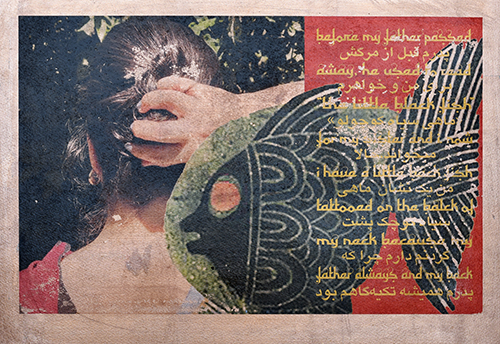South-South
 CICA Artist Roundtable held during WPC 2023 Worlding Tiohtià:ke/Montreal colloque.
CICA Artist Roundtable held during WPC 2023 Worlding Tiohtià:ke/Montreal colloque. Left to right: Amin Rehman, Pansee Atta, and Swapnaa Tamhane
Building on the work of previous years, for this year the South-South Working Group focuses on Global Asian and Asian diasporic curatorial work.
As polarization, inequity and social injustice continue to increase, the spaces where one can come together to engage in dialogue are also shrinking. It is therefore important to find ways to engage in conversations that critically reflect and engage with contemporary art and artistic practices to see how and if art can and has encouraged conversations to enact meaningful change in the day-to-day lives of Asian diasporic communities. Our focus as a working group originates from the recognition that racialized artists and diasporic communities rarely have access to institutional archives. In fact, in most cases, they must do the work of first building those archives for themselves, as researchers and artists. As a working group, we want to contribute to these self-made archives that critique how Western canons and ideologies retain their stronghold in the construction and writing of ethnocultural and global art histories.
Working in partnership with the Concordia University Research Chair in Critical Curatorial Studies and Decolonizing Art Institutions and other community partners, this year’s research meetings include a series of online talks with international curators from across Asia and Asian diasporas as well as a compilation of insights from local racialized curators on the not unrelated topics of crisis, care, and climate change. The work in this third year then brings these concerns centerstage, dispersing the findings of our work in the last three years.
Organizers
- Alice Ming Wai Jim, Professor, Department of Art History | Concordia University Research Chair in Critical Curatorial Studies and Decolonizing Art Institutions (Faculty of Fine Arts)
- Gada Mahrouse, Associate Professor, Simone de Beauvoir Institute and Women’s Studies (Faculty of Arts and Sciences)
- Nalini Mohabir, Associate Professor, Geography, Planning and Environment (Faculty of Arts and Science)
Student coordinator
- Varda Nisar, 2023 Concordia Public Scholar and PhD Candidate, Department of Art History (Faculty of Fine Arts)
Interested in joining South-South?
Contact Varda at varda.nisar@concordia.ca
 Amin Rehman, My Father, 2021, Mixed media on paper, 11"x17"
Amin Rehman, My Father, 2021, Mixed media on paper, 11"x17"
Key questions
- How does the “Global South” see, identify, and define itself?
- How do we connect with the Global South as both an abstraction and geographical reality to embrace each other's complex colonial/postcolonial histories without being essentialised?
- What is the impact of Global South discourses on the cultural production of racialized communities living and working in the Americas? How do these discourses complicate non-Indigenous, non-Black POC identifications?
- Is there an alignment of Global South and BIPOC categories? Are they adequate categories to acknowledge the diverse experiences of white supremacy by racialized communities?
- How can co-creating knowledge through dialogue, conversations and collaboration counter white supremacy and its associated hegemonic assumptions and discourses?
Group members
Faculty
- Natasha Bissonauth, Assistant Professor, Department of Visual Art and Art History, University of York; queer, trans, and feminist contemporary art practices, South Asia and its diasporas, indenture studies, archival work, and material culture.
- Surabhi Ghosh, Associate Professor, Department of Studio Arts, Concordia University; transmission of cultural identity, nationalist ideology, diasporic people, South Asian immigrants and their descendants in North America.
- Alice Ming Wai Jim, Professor, Contemporary Art, Department of Art History, Concordia University; art historian and curator of contemporary art; cultural production by BIPOC artists, diasporic art in Canada, contemporary Asian art, ethnocultural and global art histories, critical race theory, media arts, and curatorial studies.
- Rilla Khaled, Associate Professor, Department of Design and Computation Arts/Director of the Technoculture, Art and Games (TAG) Research Centre; Design and Computation Arts; playful media, interactions between games and culture, practices involved in emerging forms of game design.
- Gada Mahrouse, Associate Professor, Simone de Beauvoir Institute and Women’s Studies (Faculty of Arts and Sciences)
- Nalini Mohabir, Associate Professor, Department of Geography, Planning, and Environment, Concordia University; feminist and postcolonial migration geographies, gender and racial justice.
- Balbir K. Singh, Assistant Professor, Art and Racial Justice, Department of Art History, Concordia University; racial, gendered, and sexual politics of embodiment, Asian and Arab diasporic cultural studies; race, affect, and aesthetics; visual culture and surveillance studies; the politics of fashion and the body.
- Kanwal Syed, Assistant Professor, Art History, American University, Dubai; art historian, critical art histories, contemporary South Asian art and non-western Feminist Art, Global Art Histories.
- Jaret Vadera, Assistant Professor in Intersectional, Feminist, and Decolonial 2D and 4D Image-Making Practices, Studio Art; transdisciplinarity, glitch, rupture, parallel ways of seeing.
Students
- Priscilla Jolly, PhD Candidate, Department of English, Concordia University; researcher, tropicality, invasion, contamination, alien, postcolonial.
- Julie Alary Lavallée, PhD Candidate, Art History, Concordia; contemporary Indian Art; exhibition studies.
- Varda Nisar, PhD Candidate, Art History, Concordia; museums, South Asia, art education, pedagogy, global souths.
- Aman Sandhu PhD (research-creation) student in the Humanities at Concordia; decentering whiteness in artistic practice, place of refusal.
- Alexandra Tsay, PhD Student, Department of Art History, Concordia University; curator and researcher, contemporary art, Central Asia, aesthetic autonomy, global art history.

